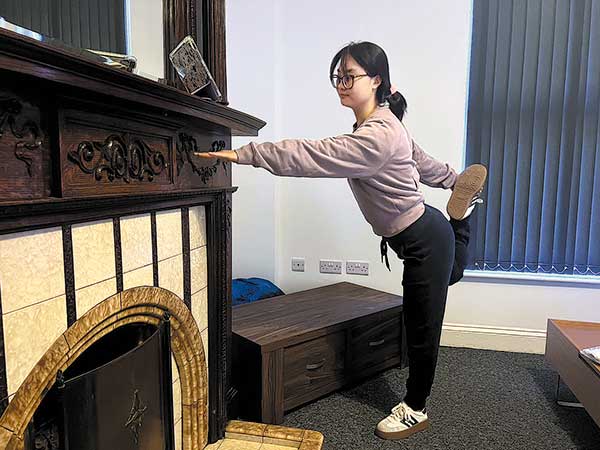Look who's telling you to lift your leg higher
Many people are using apps in which a beautiful girl with a beautiful voice tells them how to exercise. But how can she see them and what does she do with the users' videos?


"Please lift your right leg by 20 degrees… Yes, a little higher, a little more… Good! Now please hold on for five seconds, five, four, three, two, one, good. Now take some rest."
The moment she heard the female voice on her smartphone say "rest", 23-year-old Yang Man breathed easy and opened a bottle of water to drink. She was practicing high knees, a cardio-intensive exercise that involves springing between the ball of each foot (the padded portion of the sole between the toes and the arch), flexing one's knees and hips on one side to raise the other knee as high as possible. Guiding her on this exercise was a coach on her smartphone, the way health coaches at gyms provide one-to-one advice. However, there was one fundamental difference: her coach on the smartphone was not a real person, but one generated by artificial intelligence.
Coach on smartphone
Being a health freak, Yang is particular about gymming. Therefore, if she cannot go to the gym, she makes it a point to do what the AI fitness coach tells her. However, like many others she has one minor issue with the technology. "The e-coach tells me to lift my limbs by a certain angle, but who has so big a protractor to measure it," she asks. "Even if I had one, how can I measure the angle of my arm against the floor while doing high knees?"
If one has money to spare, a real fitness coach can be of much help here, but they involve high costs. At gyms in Beijing, the price of one-to-one coaching ranges from 4,800 yuan ($673.4) to 12,800 yuan a month, while the average annual income of residents in the metropolis was 81,572 yuan in 2023. "The price is reasonable," said a Beijing-based fitness coach who wished to remain anonymous.
But for Yang, a university student, it is clearly not practical to shell out so much money. In 2022, a friend recommended to her a lite WeChat-based program that could guide her to exercise. On running the program, a female model pops up on the smartphone screen to help users exercise, often telling them to lift their limbs higher if the user is reluctant. The AI fitness coach can see, so there is no scope for cheating.
"It feels like a real female coach is teaching me how to exercise," said Zheng Hong, a 27-year-old female user of another fitness app. "It always feels good to have someone standing by and it is even better if it does not cost too much."
On WeChat, Apple and android phones will find many such fitness apps, and there is fierce competition among them, forcing them to improve performance by adding extra features; they are improving the AI coach's voice and interaction style to make them look more and more human.
The one Yang uses is a typical example — it not only tells her what to do but also compliments her when she does it well. "I have tried several apps and selected the one with the most friendly female coach," she said, "which makes me feel rather safe."





































